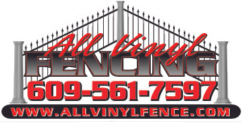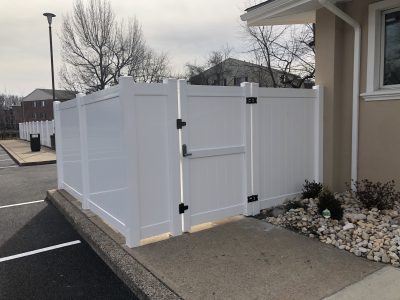Businesses and property managers have a wide range of choices in commercial fencing today. The selection usually depends on factors such as the level of security needed and aesthetic value. For example, a manufacturing facility’s prime consideration may be security to prevent theft with attractiveness being a secondary consideration whereas the function of a fence for a neighborhood swimming pool is safety.
When security is the main consideration, commercial fencing may be topped with an additional deterrent such as razor ribbon or barbed wire.
These are the 10 most common types of commercial fence.
1. Chain link is arguably the most common kind of commercial fence. It is made of steel with a galvanized coating to make it weather resistant and to prevent rust.
2. Vinyl coated chain link fencing simply adds an outer vinyl coating. It is primarily used for a more attractive appearance. Coated chain link is available in several colors, including brown, green, and black.
3. Slat fences start with the installation of a chain link fence and then the plastic slats are inserted through the openings in the fence. The slats are also available in a variety of colors. The main advantages of this type are the strength of chain link, plus the added privacy, wind protection, and security of the slats.
4. Aluminum ornamental fences are available in a number of styles, and are known by their beauty and sophistication, emulating the look of iron, at a reduced price and headache. One of their primary advantages is their low maintenance, because aluminum is highly weather-resistant.
5. Wood fences are usually associated with residential applications but they also do well in commercial situations. The most common types of wood used are pressure-treated and cedar, both of which stand up well to the elements and offer privacy and years of maintenance-free service.
6. Pool fences are becoming a legal requirement in many states, including Georgia. The principal reason for installing this type of fence is to prevent unsupervised children from wandering in and drowning. They can also prevent unauthorized people from using the pool when they are outfitted with a locking gate.
7. Vinyl fencing is available in many styles, ranging from solid for privacy to pickets for aesthetics. The primary advantages are impact-resistance and the ability to not chip, rot, fade, crack, or need painting.
8. Farm fencing is designed primarily to keep livestock inside the confines of the property. Simple rail systems may be appropriate for larger stock whereas woven wire mesh is a good choice for commercial poultry farms that raise chickens and turkeys.
9. Dog fence kennels are a special kind of fence, usually made of galvanized chain link. Although they are popular among homeowners, they are especially appropriate for dog breeders. They offer many benefits; they stand up well in the weather, they offer a range of configurations, and best of all they do not have to be permanently located in any one spot. Since they are composed of sections of fencing that are connected together they are self-supporting. This means there are never any post holes to dig.
10. Solid tongue and groove fences of vinyl are primarily for privacy, although they do offer a degree of noise control. Today they are very popular with building contractors, installing them around subdivisions. They are built by installing the posts and then sliding the horizontal panels into the adjacent posts. Their benefits include weather-resistance, being rot-proof, strength, and never needing painting. They can be power-washed for cleaning when needed.
Business owners and property managers have many choices to consider when selecting the appropriate type of commercial fencing to install.
Before making the final decision it is imperative to consider the degree of security desired, local regulations and restrictions, how much maintenance you are comfortable with, what your finished fence install should look like and your working budget.

